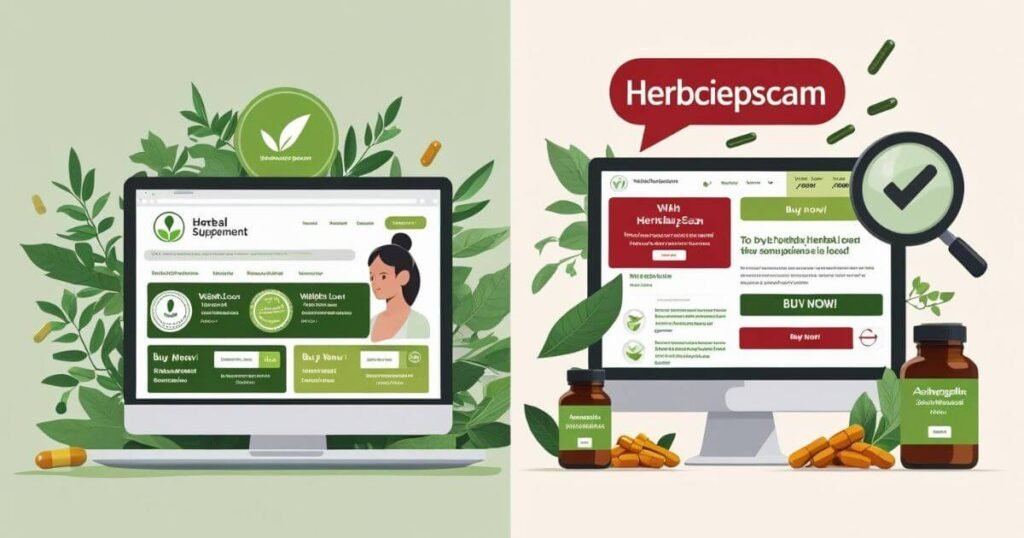In today’s digital world, it’s easier than ever to fall victim to online herbal scams. With countless websites selling natural health products that promise quick cures and miraculous benefits, consumers often face real risks. The rise of fake platforms like Herbciepscam has exposed just how vulnerable online shoppers can be to fraudulent wellness products and alternative medicine scams.
These scams not only waste money but can also put your health at risk. Understanding how to identify fake health websites and recognizing warning signs is critical. This article dives deep into the truth behind Herbciepscam and teaches you exactly how to shop smarter, safer, and more confidently when buying herbal supplements online.
What Is Herbciepscam and Why Is Everyone Talking About It?
Herbciepscam is a term that has recently flooded online forums and health communities. It reflects growing concern about shady herbal products marketed online. Many users report strange product names, suspicious supplement sites, and overly dramatic reviews. These signs often point to online herbal scams designed to steal your money or worse, damage your health.
This keyword doesn’t refer to just one scam. It represents a trend of scam health programs and sellers using the web to push fraudulent wellness products. You might come across it while searching for herbal remedies online or trying to buy vitamins and supplements. When a name feels off, or a deal looks too good to be true, chances are it may be connected to a herbciepscam setup.
For more latest news checkout, Pakistan coverage.
The Truth Behind “Herbciepscam”: Scam or Misunderstood Platform?
At first glance, some might think herbciepscam is a misunderstanding. But when you dig deeper, the pattern becomes clear. Fake names, emotional marketing scams, and fake testimonials detection tell a different story. These sites often use deceptive advertising to appear like trustworthy supplement brands, but their products lack proper testing or approval.
Many victims share similar experiences. They ordered plant-based supplements like turmeric or ashwagandha, only to receive a different item or nothing at all. These scams often operate internationally, making consumer rights protection harder. That’s why how to spot fake supplements is no longer just a helpful skill—it’s necessary.
The Dark Side of Online Herbal Products: Are You Being Misled?
In the USA, natural health products are booming. People want better sleep, weight loss, or immunity boosters without prescription drugs. But scammers know this too. They create fake health websites that look legit, but offer fake herbal products exposed as dangerous or useless.
One troubling case involved a seller promoting a blend for diabetes reversal. Customers paid over $200 for a “miracle cure” that did nothing. Many such scams prey on hope. To stay safe, learn how to research health products, and rely on third-party product reviews before clicking buy.
“Natural” Isn’t Always Safe: Herbal Products vs. Real Medicine
Some assume that if it’s natural, it must be safe. But is natural always safe? Not really. Many herbal supplement safety issues arise from poor labeling, unknown ingredients, or false promises. Unlike drugs, herbal products often skip trials and scientific proof.
According to FDA herbal product regulations, companies don’t need to prove a supplement works before selling it. That’s a gap scammers love to exploit. Real medicine is tested. A turmeric supplement scam might promise joint relief in 48 hours. But without supplement label transparency, who knows what’s really inside?
Warning Signs You’re Dealing with a Herbciepscam
Spotting a scam isn’t always easy. But there are signs. If the product page has miracle cure claims, or you can’t find a phone number or return address, be alert. If it lacks a padlock icon website or doesn’t show HTTPS website safety, your data might be at risk too.
| Red Flag | What It Means |
| “Cure-all” claims | Misleading product claims |
| No reviews outside the website | No social proof in scams |
| Vague ingredients | Hides dietary supplement risks |
| Sketchy payment page | No secure payment methods |
| Pushy language | Using urgency marketing tricks |
How Fake Testimonials and Hype Are Used to Lure Buyers

If everyone online seems to love a product, pause. Often, fake sites pay for reviews or generate them with bots. Fake testimonials detection is a skill everyone needs. Real reviews share pros and cons. Fake ones sound too polished or repeat the same phrases.
Always search the product name with “scam” or “review” and read herbciepscam review Reddit posts. People share honest experiences there. Using scam review investigation can prevent major losses, especially with unknown herbal supplement regulation loopholes in play.
Read our latest blog posts and insights, click here.
High-Pressure Tactics: “Buy Now or Miss Out!”—Should You Trust It?
Sales countdowns. Flash deals. Limited stock. These are classic high-pressure sales tactics found on scammy sites. They want you to panic and buy without checking details. These are classic cognitive bias in scams, manipulating urgency and emotion.
Good products don’t need pressure to sell. They stand on facts, reviews, and results. If a site tells you this is your only chance, it probably isn’t. Pause, read, search. These steps are part of the best tips to shop supplements safely.
Is Herbciepscam Legal? What the Law Says About Online Health Scams
Is herbciepscam legit or fake? Most cases point toward fraud. But it depends. Some sites sit in gray areas because of loose rules around supplements. The FDA doesn’t check every product before sale, only after problems appear.
When you find something wrong, FTC scam reporting is your best move. They investigate online health fraud reporting, especially when it crosses into false health claims. You can also report a scam online to local or state consumer bureaus. The more reports, the faster they act.
How to Check If a Herbal Website Is Legit
Before you buy, run a herbal site verification check. Look for real contact info, shipping terms, and privacy policy. If the site has poor grammar or design, that’s another red flag. A check website credibility search helps, and tools like WHOIS can show who owns the domain.
Got Scammed by Herbciepscam? What to Do Next
First, stay calm. Many people fall victim to alternative medicine scams, and it’s not your fault. Start by contacting your bank and disputing the charge. Save all emails and receipts. Next, report a scam online to the FTC and other authorities.
Then, share your story on scam review forums. This helps warn others and builds a case against the sellers. If the product caused harm, a lawyer might be needed. And remember: consumer rights protection is stronger when people speak up.
How to Build Digital Literacy and Shop Herbal Safely Online
Today, knowing how to avoid herbal supplement scams is a vital life skill. Teach kids, teens, and older adults about the warning signs. When someone learns digital literacy for supplements, they can avoid traps others fall into.
For safety, always use safe online wellness practices. That means checking for real science, trusted retailers, and clear refund policies. Schools and health groups should push health scam education as much as nutrition tips. And if in doubt, always ask: should I trust online herbal remedies?
Final Thoughts: Be Curious, Be Smart, and Stay Protected
Scammers thrive on fear, hope, and fast clicks. But with knowledge, they lose power. Look for supplement label transparency, third-party product reviews, and avoid sellers using emotional marketing scams.
The term “herbciepscam” may fade, but the risks are real. Protect yourself, help others learn, and stay aware of scam supplement warning signs. When in doubt, slow down. Smart shoppers ask questions, do research, and stay safe. Always remember—how to verify a supplement’s safety is your strongest defense.
Zainab Farooq is a dedicated reporter and celebrity wealth analyst with Pakistan Coverage, committed to bringing readers timely and accurate information across diverse topics. With a passion for storytelling and fact-based reporting, she covers everything from celebrity net worth insights and entertainment industry analysis to local Pakistani developments and global trends, ensuring readers stay informed about the stories that shape our world.




